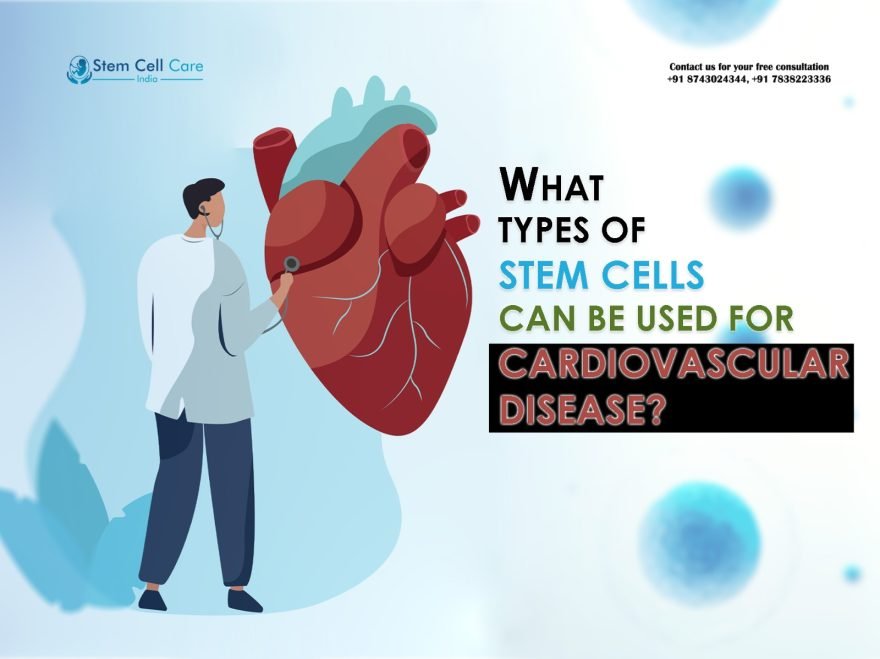Table of Contents
Stem cell therapy holds immense regenerative potential to treat cardiovascular disease. This innovative approach regenerates damaged tissues which helps in promoting healing. There are various types of stem cells that can be proven successful for treating this condition and those types are embryonic stem cells, induced pluripotent stem cells, mesenchymal stem cells, etc.
Cardiovascular is rising day by day in many individuals that’s why Stem Cell Care India introduced an innovative medical treatment called stem cell treatment for cardiovascular in India.
What Is Cardiovascular Disease and Its Symptoms?
Cardiovascular disease is a condition that affects the heart and the blood vessels which includes coronary artery disease, heart attack, stroke, and peripheral artery disease. This condition can occur by various factors such as unhealthy diet, lack of physical activity, smoking, excessive alcohol consumption, and genetics.
Symptoms of cardiovascular can depend on the specific condition but below we are going to explain some common signs:
- Chest pain or discomfort: If you are having this condition, you will feel tightness, pressure, squeezing, or burning sensation in your chest which is often referred to as angina.
- Shortness of breath: During physical activity or while lying down, you can feel difficulty in breathing. This can indicate the signs of heart failure or other cardiac issues.
- Irregular heartbeat: Arrhythmias may manifest as palpitations or the feeling that certain beats are missing.
- Fatigue: Getting unusually tired or weak after doing minimal work can be a sign of heart problems.
- Dizziness or lightheadedness: Reduced blood supply to the brain may cause periods of feeling lightheaded or faint.
- Swelling: Fluid retention in the abdomen, legs, ankles, or other parts of the body may be a sign of vascular problems or heart failure.
Early detection of these symptoms can be helpful for diagnosis and management of cardiovascular disease to prevent serious complications like heart attack and strokes. If you are facing a major heart issue, then you should visit Stem Cell Care India and choose stem cell therapy for cardiovascular in Delhi.
What is Stem Cell and Its Types?
The undifferentiated cells that have the impressive ability to develop into various specialised types of cells inner your body are called stem cells. These cells work as the foundation of organ and tissue formation which is important for both development and regeneration process. Stem cells are divided by their regenerative capacity. Here are the main types of stem cells:
- Embryonic Stem Cells: Derived from embryos during the blastocyst stage, these pluripotent stem cells have the potential to differentiate into any cell type in the body. They hold significant promise for regenerative medicine due to their versatility.
- Induced Pluripotent Stem Cells (iPSCs): These are adult cells that have been reprogrammed to revert to a pluripotent state, resembling embryonic stem cells. iPSCs offer a non-controversial alternative to ESCs and hold immense potential for personalised medicine and disease modelling.
- Bone Marrow Stem Cells: Found within the bone marrow, these multipotent stem cells are capable of differentiating into various blood cell types, including red blood cells, white blood cells, and platelets. They are commonly used in bone marrow transplants to treat certain cancers and blood disorders.
- Umbilical Cord Tissue Stem Cells: Stem cells sourced from the Wharton’s jelly of the umbilical cord. These mesenchymal stem cells possess the ability to differentiate into bone, cartilage, and other connective tissues, holding promise for treating musculoskeletal disorders.
- Adipose Tissue Stem Cells: Also known as adipose-derived stem cells (ADSCs), these multipotent cells are found in fat tissue. They can differentiate into various cell types, including adipocytes, osteoblasts, and chondrocytes, making them valuable for regenerative therapies and tissue engineering. This stem cell is helpful for treating heart disease and used in stem cell therapy in India
- Umbilical Cord Blood Stem Cells: Stem cells collected from the blood of the umbilical cord and placenta after childbirth. These hematopoietic stem cells can differentiate into all types of blood cells and are commonly used in treating blood disorders and immune deficiencies.
Why Do You Choose Stem Cell Therapy for Cardiovascular Disease?
Patients and researchers alike find stem cell therapy to be an appealing option due to its distinct advantages, which make it a promising treatment for cardiovascular diseases. Here are six key reasons why one might opt for stem cell therapy in the context of cardiovascular disease:
- Regenerative Potential: Stem cells possess the remarkable ability to differentiate into various cell types, including cardiac cells. With this regeneration capacity, injured heart tissue may be repaired, function may be restored, and general cardiovascular health may be enhanced.
- Minimally Invasive: Stem cell therapy procedures typically involve minimally invasive techniques, such as injections or infusions, reducing the risks associated with invasive surgeries. Because of this, it’s a good choice for people who might not be good candidates for conventional surgical procedures.
- Reduced Risk of Rejection: Stem cells can be derived from the patient’s own body (autologous transplantation), significantly reducing the risk of rejection or adverse immune reactions compared to donor-derived cells. This personalised approach enhances safety and improves the likelihood of successful treatment outcomes.
- Potential for Disease Modification: By targeting underlying pathology and fostering tissue regeneration, stem cell therapy has the potential to alter the course of cardiovascular disease, in contrast to traditional treatments that simply control symptoms. Long-term advantages and a more comprehensive approach to illness management are provided by this.
- Clinical Efficacy: Numerous preclinical and clinical studies have demonstrated the efficacy of stem cell therapy in improving cardiac function, reducing scar tissue, and enhancing overall cardiovascular performance. While further research is needed to optimise protocols and outcomes, the existing evidence underscores its therapeutic potential.
- Hope for Incurable Conditions: Where traditional treatments may have failed, stem cell therapy offers hope for people with severe or refractory cardiovascular illnesses. Offering patients facing otherwise hopeless circumstances the chance for significant improvements in prognosis and quality of life, it represents a frontier in medical science.
Ending Note
Various stem cell types show promise for treating cardiovascular disease, including embryonic, induced pluripotent, and adult stem cells such as mesenchymal stem cells. Their potential to regenerate damaged tissue and modulate immune responses offers hope for cardiovascular stem cell treatment, paving the way for future medical advancements.







